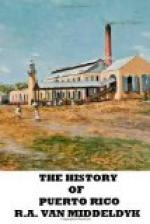Haro, the treasurer, reported to the king on October 6, 1515: " ... From the moment of his arrival Ponce has fomented discord. In order to remain here himself, he sent Zuniga, his lieutenant, with the fleet. He caused the caciques Humacao and Daguao, who had but just submitted, to revolt again by forcibly taking ten men for the fleet.”
The crown officers confirmed this statement in a separate report.
These accusations continued to the time of Ferdinand’s death (February 23, 1516), when Cardinal Jimenez de Cisneros became Regent of Spain. This renowned prelate, whom Prince Charles, afterward Emperor Charles V, when confirming him in the regency, addressed as “the Very Reverend Father in Christ, Cardinal of Spain, Archbishop of Toledo, Primate of all the Spanish Territories, Chief Chancellor of Castilla, our very dear and much beloved friend and master,” was also Grand Inquisitor, and was armed with the tremendous power of the terrible Holy Office.
It was dangerous for the accusers and the accused alike to annoy such a personage with tales inspired by petty rivalries from an insignificant island in the West Indies. Nevertheless, one of the first communications from Puerto Rico that was laid before him was a memorial written by one Arango, accusing Velasquez, among other things, of having given Indians to soldiers and to common people, instead of to conquerors and married men. “In Lent,” says the accuser, “he goes to a grange, where he remains without hearing mass on Sundays, eating meat, and saying things against the faith ...”
The immediate effect of these complaints and mutual accusations was the suspension in his functions of Diego Columbus and the appointment of a triumvirate of Jerome friars to govern these islands. This was followed two years later by the return of Bishop Manso to San Juan, armed with the dreadful powers of General Inquisitor of the Indies and by the nomination of licentiate Antonio de la Gama as judge auditor of the accounts of Sancho Velasquez. The judge found him guilty of partiality and other offenses, and on June 12, 1520, wrote to the regent: “I have not sent the accounts of Sancho Velasquez, because it was necessary that he should go with them, but the bishop of this island has taken him for the Holy Inquisition and he has died in prison.”




